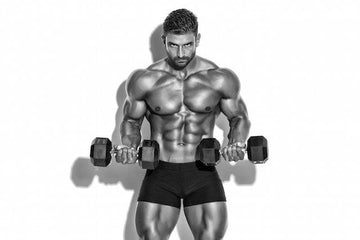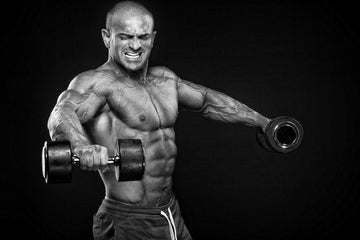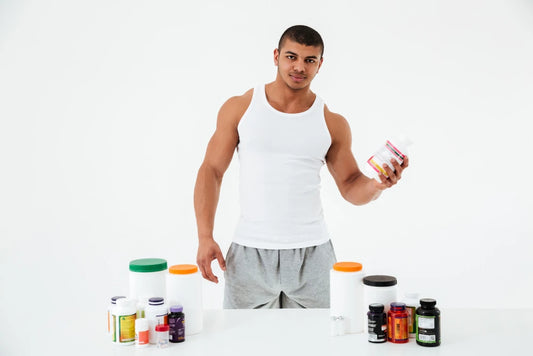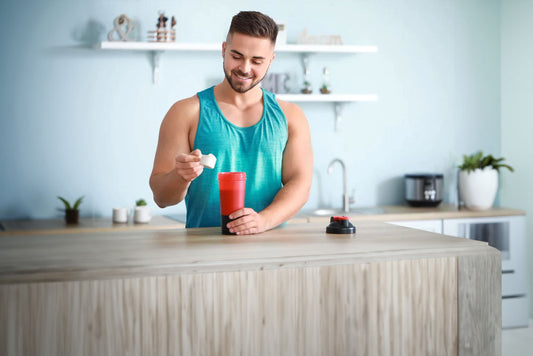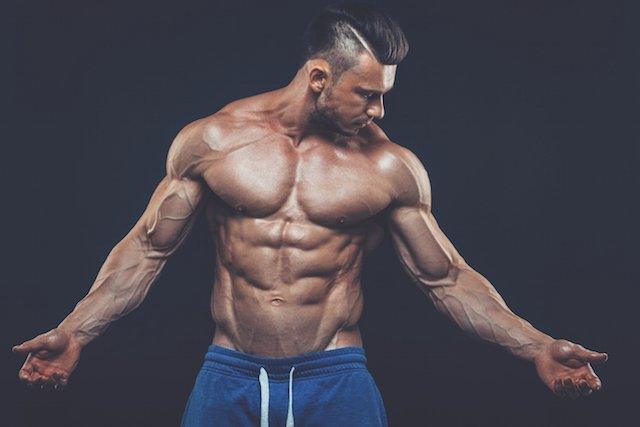

Why You’re Not Losing Bodyfat, Despite Dieting and Exercise
Table of Contents
Why You’re Not Losing Bodyfat, Despite Dieting and Exercise
By: Robbie Durand
Let’s face it, when you get older, your metabolism starts slowing down and despite dieting and exercise, your body seems to hold on to bodyfat. Chances are, if you’re not losing bodyfat and your exercising and dieting, it may not be your will will-power, it may be your testosterone.
Testosterone Physiology
Testosterone is an androgen hormone produced, in men, primarily in the testes by the Leydig cells upon exposure to luteinizing hormone, and secondarily in the adrenal glands. The vast majority of testosterone is not readily available to the androgen receptor. The large majority of circulating testosterone is bound to either albumin (38%) or steroid hormone binding globulin (60%), with the remaining 2% flowing in a free, unbound state that is available to bind to the receptor. This means only a subtle portion of free testosterone is readily available to bind to the receptor in muscle.
 Anabolic Effects of Testosterone
Anabolic Effects of Testosterone
Hormones such as human growth hormone (GH), testosterone, and IGF-1 have been shown to play a role in muscle hypertrophy and strength gains. The prevailing dogma for the past 50 years has been that testosterone increases muscle mass by stimulating fractional muscle protein synthesis. Testosterone administration also results in increases in GH secretion, androgen receptor number, satellite cell activity, and increased IGF-I expression in skeletal muscle. One of the best testosterone studies to date wanted to see what would happen if they gave ordinary men who did not exercise, a supraphysiological dose of testosterone like a bodybuilder would tale. This study is right out of the comic books, sounds like the tail of Captain America after getting exposed to the super soldier serum. Testosterone at supraphysiological levels increased muscle size and strength independent of resistance exercise. Following ten weeks of weekly injections of testosterone enanthate, total testosterone levels increased from a baseline of 502 ng·dl to 2828 ng·dl, squatting strength increased 19%, and muscle mass of the quadriceps muscles increased in men performing no resistance exercise. Let me repeat; they increased size and strength without even lifting.
Testosterone Builds Not Only Muscle but also helps with losing bodyfat
Testosterone also contributes to the maintenance of lower levels of fat mass by its conversion to estradiol. With age comes a gradual decline in testosterone production on the order of 1-2% per year, which in some men can lead to sexual dysfunction. In addition to the age-related decrease in total testosterone, there is an age-related increase in SHBG, which can further reduce circulating levels of bioavailable testosterone. The newest research shows how getting your testosterone concentrations in the right physiological range is essential for lean mass and losing bodyfat. The latest study in the prestigious Journal of Steroids, examined the association between physiologic testosterone levels with lean and fat mass. Remember, this is physiological levels or aka “natural” levels. The study reviewed the testosterone levels of 252 men; age ranges from 18-85 yrs. A morning blood sample obtained testosterone and SHBG values. DEXA machine measured body composition. When the researchers crunched all the data and statistics, the results were fascinating:

Men with total testosterone levels in the highest range had more lower-body lean mass and upper-body lean mass and less lower-body fat mass and upper-body fat mass than those in the lowest testosterone group. The researchers concluded that at physiologic levels, an association exists between higher levels of testosterone and favorable lean muscle and reduced fat measures. The men with lower testosterone were associated with reduced lean muscle mass and increased body fat. This study suggests how important it is for your to get your testosterone if you’re looking to get leaner and more muscular.
 Testosterone Post Exercise Associated with Gains in Lean Muscle Mass
Testosterone Post Exercise Associated with Gains in Lean Muscle Mass
There has been much debate as to the impact of acute anabolic hormones on muscle growth. Some studies have shown a positive effect on muscle growth, whereas other have found no impact on muscle growth. The proponents of acute exercise anabolic hormones have hypothesized that elevations in acute anabolic hormones increase the likelihood of androgen receptor binding and initiating a cascade of intracellular reactions that affects muscle growth.
Researchers examined in the Journal of Strength and Conditioning Research the impact of post-exercise hormones on Muscle growth. Pre-testing measures of muscle size (thickness and cross-sectional area) of the legs were collected in 26 resistance-trained men. Participants were randomly selected to complete a high-volume exercise program consisting of 10–12 repetitions, 1-min rest periods) or high-intensity (3–5RM, 3-min rest periods) resistance training program. During training, participants were required to complete at least 28 resistance training sessions (~90%) of an 8-wk resistance-training program (4 sessions · week) that included six upper- and lower-body exercises during each session. Blood samples were collected at baseline, immediately post-exercise, 30-min, and 60-min post-exercise during weeks 1 (WK1) and 8 (WK8) of training. At the end of the study, of all the hormones, measured, only testosterone is related to muscle hypertrophy across eight weeks of training. There were no significant pathways observed in the other hormones studies such as cortisol, GH, IGF-1, or insulin. The findings indicate that baseline muscle size and the hormonal response to resistance exercise are related to muscle hypertrophy following eight weeks of training. Further, the observed relationships appear to remain consistent regardless of whether resistance training emphasizes training volume or intensity.
Key Points: Testosterone is important for lean muscle mass, strength, and losing bodyfat. If your dieting and exercising hard and not making progress, it may be your testosterone levels and not your will power to do more.
Mangine, Gerald T., et al. “Exercise-Induced Hormone Elevations Are Related To Muscle Growth.” The Journal of Strength & Conditioning Research (2016).
Bhasin S, Storer TW, Berman N, et al (1996) The effects of supraphysiologic doses of testosterone on muscle size and strength in normal men. N Engl J Med 335:1–7.
Finkelstein JS, Lee H, Burnett-Bowie S-AM, et al (2013) Gonadal Steroids and Body Composition, Strength, and Sexual Function in Men. N Engl J Med 369:1011–1022.
Huhtaniemi IT (2014) Andropause – lessons from the European Male Ageing Study. Ann Endocrinol 75:128–131.
Vermeulen A, Kaufman J, Giagulli V (1996) Influence of Some Biological Indexes on Sex Hormone-Binding Globulin and Androgen Levels in Aging or Obese Males. J Clin Endocrinol Metab 81:1821–1826


